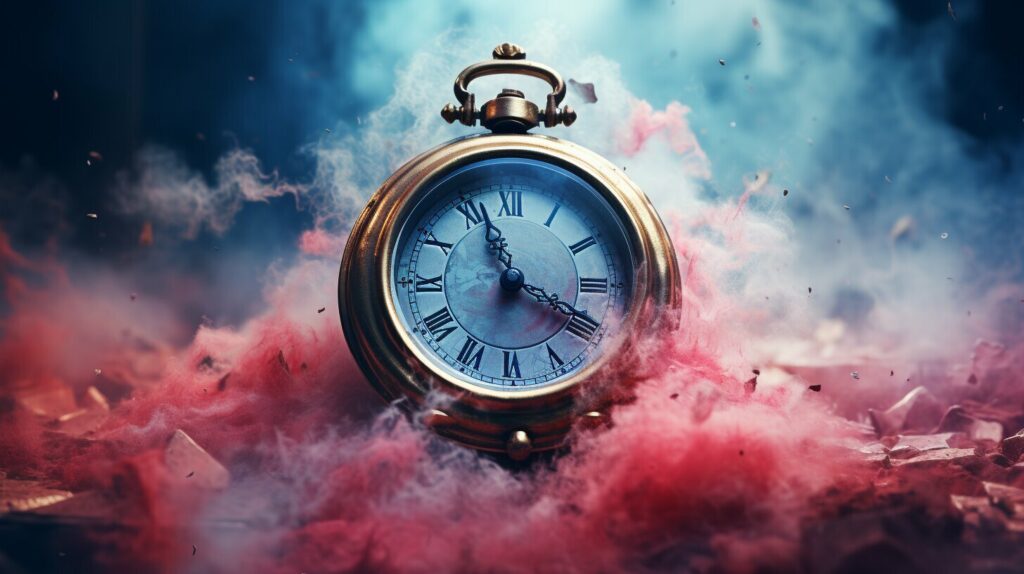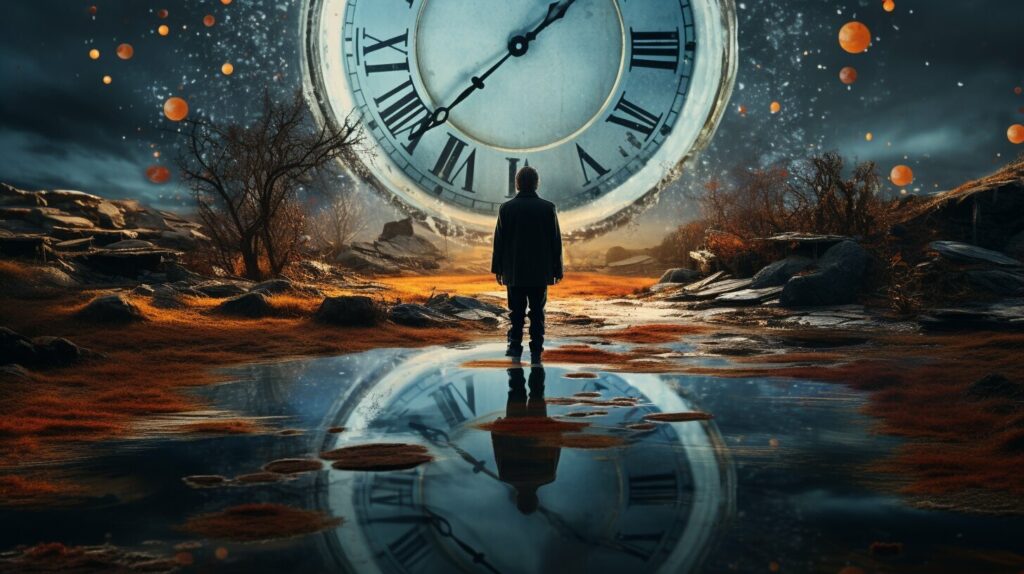Dreams have always been a fascinating subject for me. The way our minds create entire worlds that we can explore is truly awe-inspiring. One of the questions that have always intrigued me is whether time passes slower in dreams. As someone who has experienced dreams that felt like they lasted for hours, I wondered if there was any truth to this phenomenon. In this article, we will explore the concept of dream perception and delve deeper into the complex relationship between time and dreams.
Key Takeaways:
- The concept of dream perception relates to our perception of time in the dream state.
- There has been various research and theories on time perception in dreams.
The Relationship Between Time and Dreams
When we talk about the concept of time in dreams, we are referring to how time is experienced and perceived in the dream state. Time perception is a complex process, and our understanding of it in the context of dreaming is still evolving.
One theory suggests that experiences in dreams occur in a compressed time frame, which means that even if a dream seems to last for hours, it may only occupy a few minutes of actual clock time. This compressed time frame may explain why we are able to experience so much in a single dream.
Other researchers suggest that as we become more aware of time during our waking hours, we are more likely to become aware of it in our dreams as well. This could explain why some people report having dreams that seem to last a very long time, while others have dreams that feel very short.
Theories on Time Perception in Dreams
There are several theories about how time is experienced in dreams. One theory suggests that during REM sleep, which is the stage of sleep when we experience the most vivid and memorable dreams, the brain is processing information at a faster rate than during waking hours. This faster processing could create the illusion that time is passing more slowly in dreams.
Another theory suggests that the brain may be using different neural circuits to process time during sleep than during waking life. This could explain why time seems to flow differently in dreams compared to reality.
Despite these theories, the exact mechanism behind time perception in dreams remains unclear. It is likely that a combination of factors, including brain activity, memory processing, and individual differences in perception, play a role in how we experience time while dreaming.

The Relationship Between Time and Emotion in Dreams
It is important to note that time perception in dreams is not always consistent or predictable. For example, some people report having dreams that seem to last for days or even weeks, while others have dreams that feel like they are over in a matter of seconds.
Additionally, the experience of time in dreams can be influenced by emotional factors. For example, dreams that are particularly intense or emotional may feel like they last longer than they actually do. This could be because the brain prioritizes the processing of emotional information during sleep, which could slow down the perception of time.
In the next section, we will explore the phenomena of time dilation and distortion in dreams. We will discuss what these terms mean and examine the theories behind why time may appear to pass slower or faster in dreams compared to waking reality.
Time Dilation and Distortion in Dreams
One of the most fascinating aspects of dream perception is the concept of time dilation and distortion. This refers to the experience of time appearing to pass slower or faster in dreams compared to waking reality.
Time dilation is a phenomenon in which time appears to stretch out or slow down, creating the sense that a longer period of time has passed than what would be expected in waking life. On the other hand, time distortion refers to the experience of time appearing to move more rapidly, compressing longer periods of time into a shorter duration.
These experiences have been reported by individuals across cultures and throughout history, and have been the subject of much research and scientific inquiry. But what causes time dilation and distortion in dreams?
There are various theories surrounding this phenomenon. One theory suggests that our brain’s perception of time is linked to the level of neural activity occurring at any given moment. In the dream state, the brain is thought to be in a state of heightened activity, which may create the sensation of time passing more slowly or quickly than in waking life.
Another theory proposes that time perception in dreams is tied to the emotional intensity of the dream experience. For example, a dream filled with fear or anxiety may create the feeling of time moving in slow motion, while a dream that is exciting or joyful may lead to the sensation of time passing more quickly.
It’s important to note that not everyone experiences time dilation or distortion in their dreams. The subjective experience of time in dreams can vary greatly from person to person, and may even vary within an individual from dream to dream.

“The subjective experience of time in dreams can vary greatly from person to person”
Despite the varying experiences of dream time, the phenomenon of time dilation and distortion remains an intriguing area of research for scientists and dream enthusiasts alike. By understanding the complex relationship between time and dreams, we can gain insight into the inner workings of our minds and the ways in which we perceive and experience reality.
The Subjective Experience of Dream Time
While some individuals may report feeling like they experienced hours or even days in a dream that only lasted a few minutes in waking life, others may feel like they only dreamt for a few seconds. The subjective experience of dream time can vary greatly from person to person.
This difference in perception has led some researchers to speculate that our personal experiences, emotions, and expectations can play a role in how time is perceived in dreams. For example, if you are having a nightmare, time may appear to pass more slowly, as your brain processes more information and your heart rate increases. On the other hand, if you are having a pleasant dream, time may appear to go by quickly, as you are engrossed in the enjoyable experience.
Additionally, some individuals may have a heightened ability to perceive time differently in dreams. For example, those who frequently experience lucid dreams may have greater control over their perception of time, allowing them to manipulate the passage of time within their dreams.
It is important to note that the subjective experience of dream time is still a subject of ongoing research and debate, and further study is needed to fully understand the complex relationship between time and dreams.

Dreams are often most profound when they seem the most crazy.” – Sigmund Freud
Theories on Time Perception in Dreams
Experts have proposed various theories to explain the complex relationship between time and dreams. These theories attempt to shed light on why time may appear to pass slower or faster in dreams compared to waking reality. Here are some of the most prominent theories:
- Dream compression theory: This theory suggests that dreams occur in real-time, but the brain compresses the events to fit into a shorter time frame. This compression may create the illusion of time passing more quickly in dreams.
- Memory consolidation theory: According to this theory, dreams play a vital role in consolidating and processing memories. Dreams may create a condensed version of events, leading to the perception of time passing more quickly.
- Emotion regulation theory: This theory posits that dreams serve as a mechanism for regulating emotions. Dreams may present emotionally charged events in a condensed form, leading to the perception of time passing more quickly.
- REM sleep and brain activity theory: During REM sleep, the brain experiences high levels of activity, leading to the perception of time passing more slowly. This theory suggests that the intensity of brain activity during REM sleep may cause time dilation in dreams.
- Subjective experience theory: This theory suggests that each individual’s perception of time in dreams is subjective and varies from person to person. Factors such as personality, emotions, and past experiences may influence how time is experienced in dreams.
While these theories offer insight into the complex relationship between time and dreams, the exact mechanisms behind time perception in dreams remain elusive. Further research is needed to fully understand this phenomenon.

Understanding the Science Behind Dream Time
When it comes to understanding the phenomena of dream time dilation, science has provided some insights into how it may occur. One theory suggests that time perception in dreams is influenced by brain activity and neural processes.
During REM sleep, the brain becomes highly active and the prefrontal cortex, responsible for logical thinking and time perception, becomes less active. This change in brain activity may lead to a distorted perception of time, where seconds may feel like hours or vice versa.
Another theory proposes that the way time is experienced in dreams is related to how it is processed in waking life. Our perception of time is influenced by our surroundings and experiences, and this may also be reflected in our dreams. For example, if we are used to a fast-paced lifestyle, we may experience time as moving quickly in our dreams as well.
Research has also shown that the concept of time perception is subjective and can vary from person to person. This may explain why some individuals report experiencing longer or shorter dream periods compared to others.

Overall, although the exact mechanisms behind dream time dilation are not yet fully understood, science has shed some light on how our brains may perceive time differently in the dream state.
Personal Experiences and Anecdotal Evidence
Many people have reported their own perceptions of time in their dreams. These anecdotal accounts range from feeling as though hours have passed in a dream that only lasted a few minutes in real time, to feeling as though the dream lasted only a few seconds when it actually went on for hours.
One individual reported having a dream where they spent what felt like an entire day at work, and were surprised to wake up to find that only a few hours had gone by in real life. Another individual reported experiencing a dream that felt like it lasted for years, but only a few hours had passed in reality.
While these personal experiences are subjective and may not be scientifically proven, they do provide insight into how time is experienced in dreams. It seems that the perception of time in dreams can vary widely from person to person, and even from dream to dream.
I remember having a dream where I was running very quickly, and everything around me was moving slowly. It felt like time was standing still.”
These accounts of dream time perception can also be influenced by external factors, such as stress, anxiety, or even medication. It is important to note that personal experiences and anecdotal evidence should not be taken as conclusive evidence, but rather as a starting point for further research.
However, these accounts do highlight the complexity of our perception of time in dreams, and the need for further exploration and understanding of this phenomena.

Image source: seowriting.ai
Exploring Lucid Dreaming and Time Manipulation
In addition to observing the phenomenon of time dilation in dreams, some individuals have reported being able to manipulate the perception of time within their dreams through the practice of lucid dreaming. Lucid dreaming is a state in which the dreamer is aware that they are dreaming and can consciously control their actions and surroundings within the dream.
During a lucid dream, individuals have reported being able to slow down or speed up the passage of time within their dream, potentially providing evidence to support the theory that time perception in dreams is malleable and under some level of personal control.

The techniques used for lucid dreaming vary, but commonly involve practices such as reality checks (checking if you are dreaming in waking life), setting intention before sleep, and keeping a dream journal to enhance dream recall and self-awareness.
“When I realize I am dreaming, I can slow down time to analyze my surroundings more thoroughly. It’s like I have all the time in the world to explore my dream space.
While research on lucid dreaming and time manipulation is limited, anecdotal evidence from individuals who have experienced this phenomenon suggests that the perception of time in dreams may be more malleable than previously thought.
However, it’s important to note that not all individuals are able to achieve a lucid dreaming state, and even those who do may not always be able to successfully manipulate the passage of time within their dreams.
Overall, the practice of lucid dreaming provides a unique opportunity to explore the relationship between time and dreams, and may offer further insights into the complex nature of time perception within the dream state.
Conclusion
After exploring the complex relationship between time and dreams, I believe that it is still unclear whether time passes slower in dreams or not. While there are numerous theories and research studies that suggest that time dilation and distortion occur in dreams, there is also anecdotal evidence from individuals who report experiencing time similarly in both waking and dreaming states.
It is important to note that the experience of time in dreams is subjective and can vary among individuals. Factors such as mood, stress levels, and overall mental state can influence how time is perceived in dreams. Additionally, the concept of lucid dreaming and its potential role in time manipulation within dreams adds another layer of complexity to this topic.
Further research is needed to fully understand the mechanisms behind dream time perception and the potential implications of these findings. Ultimately, this exploration into the relationship between time and dreams highlights the fascinating and mysterious nature of our subconscious minds and the complexities of human perception.
FAQ
Q: Does time pass slower in dreams?
A: In this article, we explore the concept of dream perception and how it relates to our perception of time in the dream state.
Q: What is the relationship between time and dreams?
A: This section delves deeper into the relationship between time and dreams. We discuss how time is experienced in dreams and explore various theories and research surrounding time perception in the dream state.
Q: What is time dilation and distortion in dreams?
A: Here, we explore the phenomena of time dilation and distortion in dreams. We explain what these terms mean and examine the theories behind why time may appear to pass slower or faster in dreams compared to waking reality.
Q: How is time experienced subjectively in dreams?
A: This section discusses the subjective experience of time in dreams. We explore how individuals perceive time differently in their dreams and how this subjective experience can vary from person to person.
Q: What are the theories on time perception in dreams?
A: Here, we examine the various theories proposed by researchers and experts on time perception in dreams. We explore the different perspectives and explanations for why time may be experienced differently in the dream state.
Q: What is the science behind dream time dilation?
A: In this section, we explore the scientific explanations behind dream time dilation. We discuss the role of brain activity, neural processes, and the concept of time perception in understanding how time is experienced in dreams.
Q: Is there any personal anecdotal evidence regarding time experience in dreams?
A: Here, we include personal experiences and anecdotal evidence from individuals who have reported their own perceptions of time in dreams. We analyze these accounts and discuss their potential implications in understanding the relationship between time and dreams.
Q: Can time be manipulated in lucid dreaming?
A: In this section, we explore the concept of lucid dreaming and its potential role in manipulating time perception within dreams. We discuss techniques, experiences, and research related to time manipulation in lucid dreams.
Q: What is the conclusion regarding time perception in dreams?
A: This final section summarizes the key points discussed in the article and provides a conclusion on whether time passes slower in dreams or not. We also touch upon the implications of these findings and the potential for further research in understanding the complex relationship between time and dreams.






